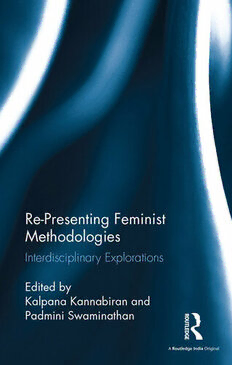
Re-Presenting Feminist Methodologies: Interdisciplinary Explorations PDF
02017·0.505 MB·English
Most books are stored in the elastic cloud where traffic is expensive. For this reason, we have a limit on daily download.
Preview Re-Presenting Feminist Methodologies: Interdisciplinary Explorations
Description:
This book tracks the trajectory of gender in the social sciences and humanities through an exploration of the challenges and contradictions that confront contemporary feminist analysis as well as future directions. Drawing on research in India, the essays in the volume engage with the subject in imaginative ways, each one going beyond documenting the persistence of gender inequality, instead raising new questions and dilemmas while unravelling the complexities of the terrain. They also interrogate extant knowledge that has 'constructed' women as 'agentless' over the years, incapable of contesting or transforming social orders - by taking a close look at gendered decision-making processes and outcomes, sex for pleasure, health care practices, content and context of formal schooling or the developmental state that 'mainstreams' gender. Do existing feminist methodologies enable the understanding of emerging themes as online sexual politics, transnational surrogacy or masculinist 'anti-feminist' sensibilities? The feminist methodologies delineated here will provide readers with a toolkit to assess the criticality of gender as well as its nuances. The work foregrounds the importance of intersectionality and builds a case for context-specific articulations of gender and societies that destabilize binary universals.This volume will be useful to scholars and researchers across the disciplines of the social sciences and humanities, especially gender studies, women's studies, feminism, research methodology, education, sociology, political science and public policy.
See more
The list of books you might like
Most books are stored in the elastic cloud where traffic is expensive. For this reason, we have a limit on daily download.
